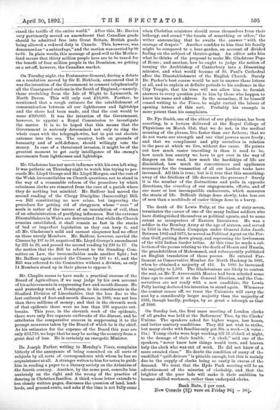Dr. Joseph Parker, writing to Monday's Times, complains bitterly of
the annoyance of being consulted on all sorts of subjects by all sorts of correspondents with whom he has no acquaintance at all. A stranger writes to him for noteq to guide him in reading a paper to a literary society on the Arianism of the fourth century. Another, by the same post, consults him anxiously on the right and the wrong of the practice of dancing in Christian families. A third, whose letter extends to ten closely written pages, discusses the question of land, land. lords, and ground-rents, and asks if tho time is not fully come when Christian ministers should rouse themselves from their lethargy, and sound "the tocsin of something or other," the writer announcing that he awaits the answer "with the courage of despair." Another confides to him that his family might be compared to a bear-garden, on account of divided feeling on the subject of theatre-going. An editor asks him what he thinks of the proposal to make Mr. Gladstone Pope of Rome; and another, how he ought to judge the notion of turning the Archbishop of Canterbury into a Dissenting minister, and what would become of St. Paul's Cathedral after the Disestablishment of the English Church. Surely Dr. Parker's best course would be not to answer these letters at all, and to explain at definite periods to his audience in the City Temple, that his time will not allow him to furnish answers to every question put to him by those who happen to know his name and address. In the meantime, if he himself ceased writing to the Times, he might curtail the labour of opening letters of this sort. Probably his example is more potent than his complaints.


















































 Previous page
Previous page